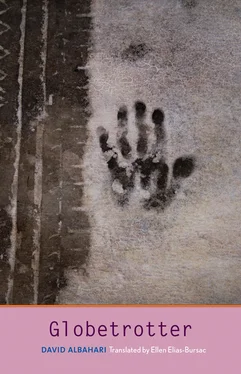In the end he had begun to think that all books should be written that way or at least published that way, with the pages displaced, which would turn reading into the constant search that is, in his profound belief, he said, the very essence of reading, though that doesn’t matter so much; more important is that all this contributed to the absence of all worry, and now, when I had finally turned up, he said, it was clear just how much this, his reading, had been the right choice. Now, he said, he could put the book back into his pocket, and into his pocket it disappeared. If we were in Saskatchewan, I thought, none of this could happen. I still didn’t dare move. On the plains, I thought, every movement is a form of standing still, while in the mountains you are always active, at some stage of moving, forced to climb or slow your descent. What goes on in the plains only happens through conscious effort, while in the mountains, it happens by itself. When I stand here, I thought, I am actually walking, or falling, which may be the same thing. Of course, had I really been walking, I would already have been between Daniel Atijas’s widespread legs, and I was not there — that at least I know. But still he had thought of something at one point, Daniel Atijas went on, patting his pocket gently as if to console the book that had suddenly dropped into darkness; he had recalled why he had come looking for me at the studio and resolved to wait, no matter how long it took.
Now this, no doubt about it, was passion — albeit unexpected — for though I knew that under his serene demeanor Daniel Atijas possessed a fervid spirit, I had not believed he would be able to show it. I wasn’t sure whether to be glad or worried: glad that I still, at least like this, could stir someone’s passion, or worried that my judgment — which I prided myself on, and not without reason — had lost its edge. All of a sudden it hit him that afternoon, continued Daniel Atijas, that I had never once invited him to see my paintings, and the thought had stung him like a lash. He had been sitting in the living room of the home of the director of the Literary Arts Programs, where he was sipping Ceylonese tea with the director’s wife, when one of them mentioned me in passing. The wife of the director of the Literary Arts Programs remarked that I was known for my “broad sweeps.” What are “broad sweeps”? asked Daniel Atijas, and how could it be that I had never offered to show him my works? I don’t know why he felt the need to refer to my paintings as works — he didn’t look like the type who so readily forgets the words for things — but I was no longer sure of anything. Had I been able to, I would have melted under the rays of the sun, which was somewhere high in the sky, up above, covered at times by clouds, as could be seen by the shadows that occasionally slid over the conifers and the studios. I took a step somehow to the side instead of forward, but I had to move if I wanted to speak, and I told him I had no explanation for it, that some things happen despite our best intentions and that regardless of how much we take part in them, we can only watch ourselves from the sideline as if we were a stranger.
Daniel Atijas said this was silly, that nothing, nothing at all, happens despite our will, for which there was solid proof, he said, though he didn’t give a single example but instead explained that he was loath to contradict me, which flew in the face of all of his convictions, but we had so little time left and shouldn’t be wasting it on squabbles; we should be talking instead about how we’d spend tomorrow with Ivan Matulić’s grandson. I could have turned and left, I was so infuriated by the mention of the grandson, but there was already a lot of passion in that little space out in front of my studio. Instead, as if repeating the secret signal, I patted my pocket, pulled out my key chain, and moved toward the door. I had nothing to fear: the drawings were tucked away in the pad in the corner, safe behind a pile of canvases, and only with a thorough search — which there was no call for, nor would such a thing even occur to Daniel Atijas, he’s not that type of person, or, I corrected myself, he didn’t look like that type of person — could the drawings be found. Daniel Atijas followed me, came up the steps, waited for me to unlock the door, then cautiously, when I opened the door, stepped into the studio as if he were fearful of knocking something over. I offered him coffee; he asked for a glass of water. I didn’t know what he expected to see, but he seemed disappointed. The smile with which he entered and with which, I’m convinced, he meant to greet the teeming chaos of creativity, slowly faded. He turned around once more, cast a glance over the only paintings he could see, hung on opposite walls, one exactly across from the other, and he came over to A Rainy Day on the Prairie, right up to the canvas until his nose was almost touching the layers of paint.
The other one, I later explained, had the title A Bad Day for a Reaper, and a reaper, in a light-blue worker’s overall, reclining on a lounge chair, was watching a combine in the middle of a grain field. His face was reflected on the blade of the scythe on his lap: the left side of his face, his bushy eyebrows, his cheek bristly with stubble, and a bead of sweat there, transparent and slighty irregularly dented, whose convoluted surface exactly reflected the red combine. I do not believe Daniel Atijas noticed this little game, this multiplication of reflections, for he spent less than a minute standing in front of the painting, actually both paintings, long enough to praise my ability, as he put it, to remove the barriers between different levels of reality but not long enough to convince me that he was genuinely interested. He still wanted to know, he said, what the “broad sweeps” were that the wife of the director of the Literary Arts Programs had spoken of, for though he couldn’t, with confidence, say what this had meant to him when he heard it, clearly these paintings, despite all their qualities and unusual angles of observation, were no groundbreaking novelty, which, he said, as far as he was concerned, would be the only sweep that would allow movement sideways or forward. I don’t understand, I said, how “sweep,” which is more evocative of a movement to the right or left of center, could also suggest forward movement, but her words, I said, remind me of the time when I was painting barns and grain silos for hardly any money.
Even now, I said, if he were to come to Saskatchewan, he would be able to see several of my “broad sweeps,” almost always painted with a nod to socialist realism: men in rubber boots, women in head scarves, everywhere sheaves of grain and machine parts. I always feel that the cogs and flywheels lying about are highly subversive in Soviet realism because they look more like the unreal flying objects in the surreal paintings of Magritte and Dalí than they do like tools, and I still cannot understand, I said, why the censors never banned them. Because, said Daniel Atijas, fantasy, a reality above reality, never bothered them; they had Gogol, after all, and those other writers — he couldn’t remember the names — who, and one can say this freely, had a decisive impact on defining literary fantasy; what they, meaning the censors, he said, didn’t like were attempts at depicting another, parallel reality, another face of the reality in which they actually lived, which, in essence, was more fantastic in its illusion than any of Gogol’s stories. Anyone who had lived under communism, as, for instance, he had, said Daniel Atijas, laying his hand on his chest, will understand this process of an ongoing simulation of reality, a process in which nothing, in the end, is real, nothing is what it seems, nothing has a right side, only a wrong side. But let’s drop the question of communism, he said, whose trajectory is on the wane, though he did hope it would not vanish from the earth, because that would knock the world out of kilter, disrupt its equilibrium, an imbalance that had been in evidence since the crash of communist ideology, and though one could still speak of the world’s being slightly askew, it had not turned completely upside down, as it surely would were that to happen.
Читать дальше







![David Jagusson - Fesselspiele mit Meister David [Hardcore BDSM]](/books/486693/david-jagusson-fesselspiele-mit-meister-david-har-thumb.webp)




